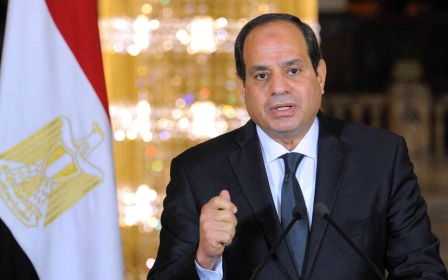Egypt restricts NGOs in 'growing crackdown' on dissent
Egypt issued a new law on Monday that regulates the work of non-governmental organisations, a measure seen by rights groups as the latest sign of a growing crackdown on dissent against President Abdel Fattah al-Sisi.
Human rights groups and activists say the law in effect bans their work and makes it harder for charities to operate.
The measure restricts NGO activity to developmental and social work and introduces jail terms of up to five years for non-compliance.
It gives Egypt's 46,000 NGOs one year to comply or face being dissolved by a court.
Parliament passed the bill in November but it had to be ratified by Sisi.
Egyptian rights activists say they face the worst crackdown in their history under Sisi, accusing him of erasing freedoms won in the 2011 Arab Spring uprising that ended Hosni Mubarak's 30-year rule.
The government had been working for years on a new law regulating NGOs, which rights groups feared would be more restrictive than Mubarak-era rules, but the bill drafted by lawmakers was so restrictive even cabinet ministers objected.
Mohamed Zaree, Egypt programme director at the Cairo Institute for Human Rights Studies, told Reuters the new law on NGOs was "the worst in history" and would practically ban NGOs from carrying out their work.
"The state is operating with no strategy or vision," said Zaree, whose organisation will be one of those affected. He is already banned from travel and has been charged with "receiving funds from foreign entities to harm national security".
Lawmakers say the measure is necessary to protect national security. The government has long accused human rights groups of taking foreign funds to sow chaos, and several are facing investigations over their funding.
"Cairo will no doubt be met with a lot of concern raised internationally around the passage of the law - but the Egyptian authorities have assessed that, and are moving forward, clearly," said HA Hellyer, senior non-resident fellow at the Atlantic Council.
Charity role
Even apolitical charities say the measure restricts them at a time when subsidy cuts and tax increases have made it harder for Egyptians to make ends meet.
Following the rise in prices that followed the government's decision to devalue the currency last year, Zaree said civil society groups should be allowed "to serve the needs of the community by offering the services that the government could not, instead of passing a law that ends their role".
Charities have long played an important role in feeding and clothing people and providing healthcare and education in a country where millions live on less than $2 a day.
Provisions obliging NGOs to inform authorities before collecting and spending donations will bog them down and stifle their work, NGO workers say.
Under the new law, donations exceeding $550 must be pre-approved. If no approval is granted within 60 days, the request is automatically denied. Failure to inform authorities could result in jail terms of up to five years and fines of up to $55,000.
The law also gives the government power over deciding who can establish an NGO and for what purpose.
It obliges groups to stick to the "state's development plan", severely restricting the work they can do in areas the government does not consider a priority.
The law also bans domestic and foreign groups from engaging in political activities or anything that harms national security, public order, public morals or public health - a means, say rights groups, to stifle dissent.
The law comes at a time when rights groups and opposition members say a government crackdown on them is expanding.
Earlier on Monday, Egyptian human rights lawyer and would-be presidential candidate Khaled Ali went on trial in a case where a guilty verdict would deprive him of the right to stand for election.
Middle East Eye propose une couverture et une analyse indépendantes et incomparables du Moyen-Orient, de l’Afrique du Nord et d’autres régions du monde. Pour en savoir plus sur la reprise de ce contenu et les frais qui s’appliquent, veuillez remplir ce formulaire [en anglais]. Pour en savoir plus sur MEE, cliquez ici [en anglais].




